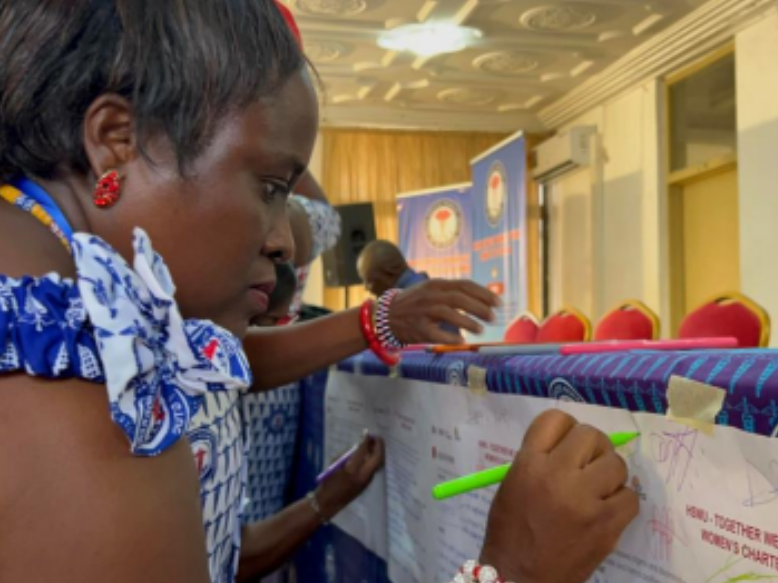Advancing the Rights of Women Health Workers in Ghana

In Ghana, women make up 59 percent of the health workforce, yet they face persistent obstacles that directly impact their ability to provide quality care in their communities as well as hinder opportunities for their professional growth. Unsafe working environments, underrepresentation in leadership roles, and lack of access to fair wages and secure employment are common concerns raised by these care workers. Gender-based violence and harassment in the workplace is pervasive, training is sparse or difficult to access, and many women working in the health sector feel the strain of these issues affecting their lives and livelihoods. Under a new Charter, they are paving a way to change their work environments to be fair, safe and gender-equitable.
The USAID Gender Equity and Equality Action Fund (GEEA Fund) activity Together We Care (TWC) is enabling systemic change for these care workers in Ghana—particularly for health workers working in private hospitals or as subcontracted workers—by supporting their organizing, collective bargaining, and strengthened leadership. Implemented by the Health Services Workers Union (HSWU) in partnership with UNIGlobal Union, TWC is driving structural changes in the care economy by strengthening collective representation, boosting women’s economic security and promoting safer and violence-free work environments.
As part of these activities, over 800 health and care workers recently gathered, hosted by local governments, in Tema and Kasoa. These workers, representing 42,000 of their colleagues, discussed critical issues of better wages, improved working conditions, and the fight against gender-based stigma, violence, harassment, and discrimination in the workplace. The event culminated in their development and endorsement of the Health Services Workers Union Together We Care Women’s Charter—a unique effort that will work to address four critical areas essential for improving the conditions and support of women health and care workers in Ghana:

A Health Services Workers Union Women’s Committee member participates in the development of the Women’s Charter. Photo Credit: UNIGlobal Union
- Gender-based Violence and Harassment Prevention: Promote the ratification of the International Labour Organization Convention 190 to eliminate violence and harassment in the workplace, advocating for national legislation to enforce these global standards in healthcare settings.
- Health and Safety: Work to educate and advance workplace health and safety, particularly in preventing and addressing gender-based violence and harassment and for the establishment of clear reporting mechanisms and support systems for survivors of violence in the workplace.
- Collective Power: Build collective power among women health and care workers, especially those in the private sector, who often lack collective bargaining agreements. Through rights training and campaigns focused on better wages and working conditions, the Charter will strengthen the collective voice of health and care workers, positioning them to influence policy changes.
- Women’s Leadership Development: Cultivate leadership skills among women health and care workers through union organizing, negotiation, and advocacy skills training. By increasing women's representation in leadership roles, the charter supports women in effectively advocating for their rights and shaping policy decisions.
For Mabel, a Human Resource Manager at a local hospital and leader within HSWU, the Charter is key to amplifying women’s voices. “Other women may not be comfortable to come out and discuss the challenges women are facing. [The Charter] will provide an opportunity to women to voice their challenges and not feel intimidated. To give them power.”
She has seen firsthand the obstacles that many women face working in health, including instances of discrimination, such as sexual harassment and women being denied leadership roles while breastfeeding. Her message to women health and care workers in Ghana is clear: “We need to fight for each other and we need to support each other. We need women in leadership positions so women’s issues will be discussed.
The Together We Care Women’s Charter exemplifies USAID’s continued commitment to protecting and supporting health and care workers, while prioritizing women’s equity and inclusion, through investments that advance the priorities of the U.S. Strategy on Global Women’s Economic Security and the Global Health Worker Initiative.
In partnership with Mabel and with healthcare workers around the world, USAID is working to build a more resilient and equitable health and care workforce that is equipped to respond to future challenges and deliver quality care within communities.
About the Author(s)
Eva Neligh
Gender Advisor and Analyst
USAID’s Gender Equality and Women’s Empowerment Hub
Ashley Clonchmore
Health Workforce Engagement Advisor
USAID’s Bureau of Global Health
Mary Addo-Mensah
Project Management Specialist
USAID Ghana Bilateral Mission
Resources